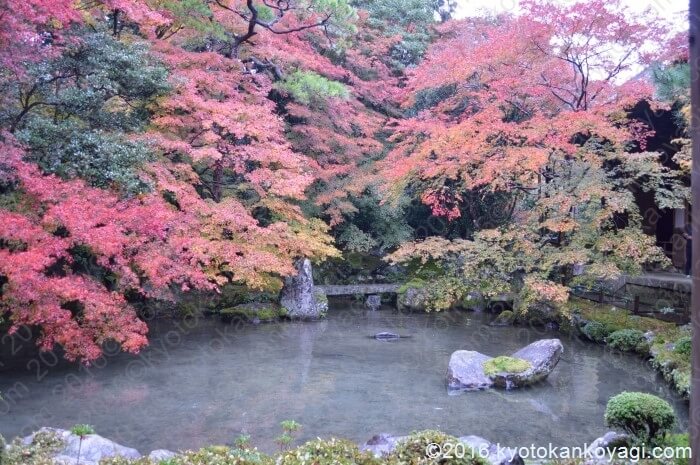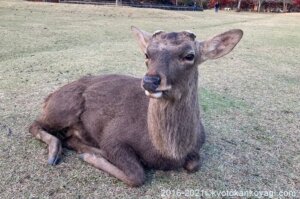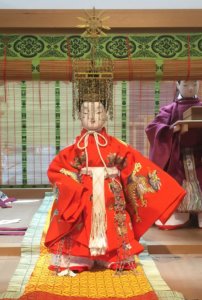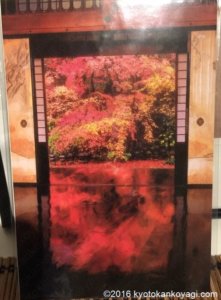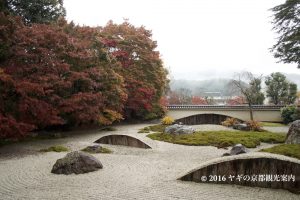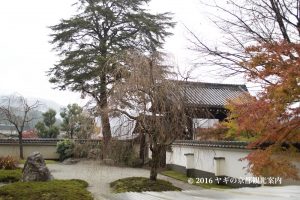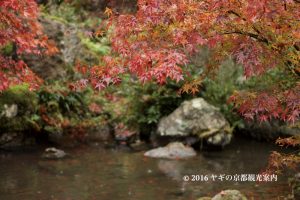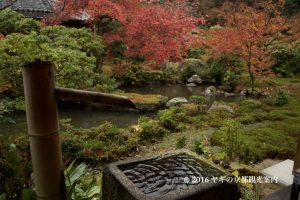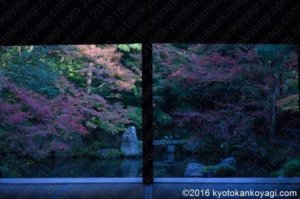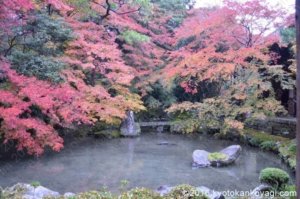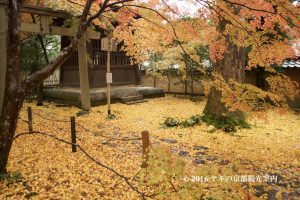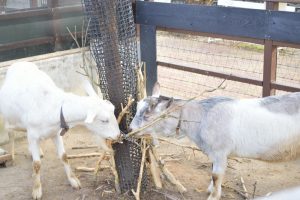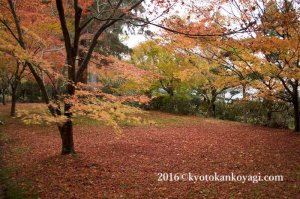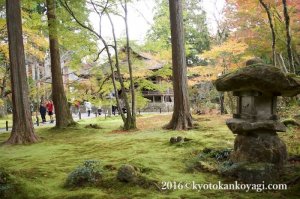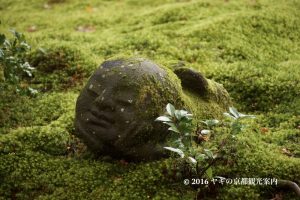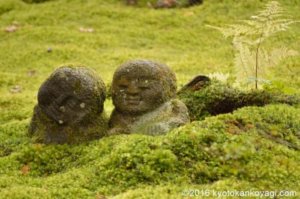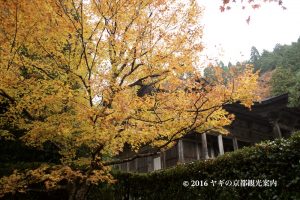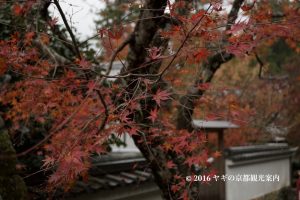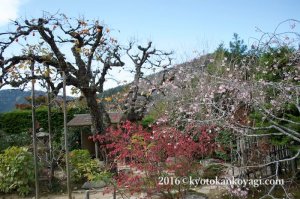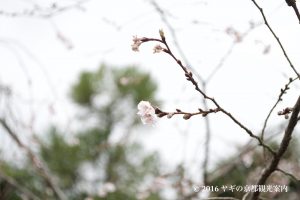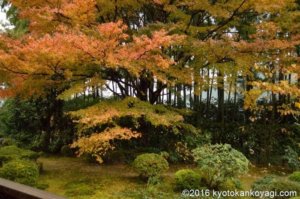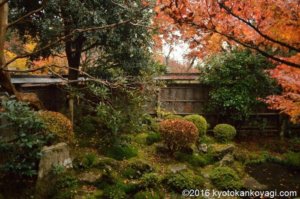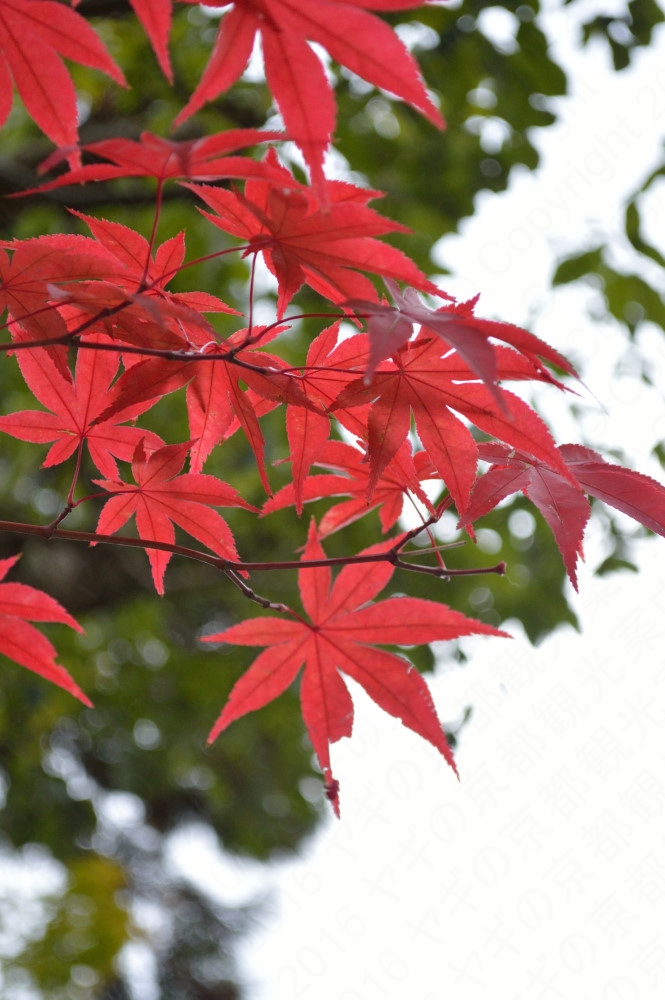Introduction
In this post, I’ll show you an itinerary to visit some underrated places on the outskirt of Kyoto: Jisso-in temle, Rengeji temple, Sanzen-in temple, Jikko-in temple, and Hosen-in temple. At Sanzenin and Jikkoin, we can enjoy Sakuras (Not the same ones we can find in spring)
Sakuras in FALL?
Start at Kokusai Kaika station
Kokusai Kaikan station around 8:20
Arrive at Kokusai Kaikan station and take Kyoto Bus no.24 for IWAKURA JISSO-IN at BUS STOP 1.

Kyoto Bus. Not Kyoto city/municipal bus, O.K. ?
Check out the time table.
Time table
- Weekdays 8:45 Kokusaikaika mae bus stop →8:56 Iwakura Jissoin bus stop
- 土・休日 8:44 Kokusaikaika mae bus stop→8:55 Iwakura Jissoin bus stop
Jisso-in Monzeki temple 実相院門跡
About Jissoin Monzeki temple 実相院について
- Crowded?・・・★☆☆☆☆
- We arrive・・・9:00
- We leave・・・10:00
- Entrance fee・・・500 JPY
- Website・・・Jissoin (in Japanese)
Jissoin is some of Monzekis. Monzeki is a temple run by an abbot of the imperial lineage. It used to be located in Kamigyo and it moved to Iwakura due to Ohnin no Ran, the largest civil war and restored by Tokugawa Iemitsu, the 3rd Shogun of the Tokugwa Shogunate. The main hall has a modern Karesansui garden and a small stroll garden. It is a very quiet place and we can hear cheerful songs in week days from a kindergarten located near the temple.
Yuka Momiji 床紅葉
On the well-polished floor in the main hall, we can enjoy “Yuka Momiji (a kind of Mizukagami of the autumn leaves).”

We can’t take photos. This is a photo of a post card available in the temple.
Kokono no Oniwa (The garden of hearts) 枯山水庭園「こころのお庭」
A unique Karesasui garden constructed by citizens. Taking advantage of Mt. Hiei as Shakkei, it has a “depth”.

We say “depth” in Japanese and I have no idea how would I say in English. I mean the garden looks so large thanks to the mountain. For Japanese people, I guess 9 out of 10, find the garden large because they see the mountain as a part of the garden without conscious and intention. That’s the effect of Shakkei.
The stroll garden池泉回遊式庭園
The autumn leaves here are very exquisite. With beautiful mosses, we can under stand what calmness is.
For Rengeji temple 蓮華寺に向け出発
Leave Jisooin around 10:15 実相院出発
Leave Jissoin temple around 10:15.
Take Kyoto Bus no. 24 for Kokusai Kaikan
- Weekdays 10:29 Iwakura Jisso-in bus stop→10:38 Kamitakano bus stop
- Weekends and holidays 10:25 Iwakura Jisso-in bus stop→10:34 Kamitakano bus stop
At Kamitakano bus stop around 10:35
At Kamitakano bus stop, we change bus. Kyoto Bus no.24 to 19 for Ohara.
- Weekdays 10:47 Kamitakano bus stop→10:51 Kanbashi bus stop
- Weekends and holidays 10:48 Kamitakano bus stop→10:52 Kanbashi bus stop
Rengeji temple 蓮華寺
About Rengeji temple 蓮華寺について
- Crowded?・・・★☆☆☆☆
- We arrive・・・11:00
- We leave・・・11:50
- Entrance fee・・・500 JPY
- Website・・・Not available
Ohnin no Ran devastated Rengeji and it moved to Takano in the 17th century. It is one of the most underrated place in Kyoto. We can enjoy the tranquility there. The statue of Siddhartha Gautama enshrined used to belong to Enryakuji temple.

One of my favorite places.

The garden
We can admire a garden stands for Mt. Horai, the mysterious mountain found in Taoism. We can take photo of it only in a room of the temple. The scene makes a typical Gakubuchi Teien. In this art, we take pillars and beams as picture frames.
Near the Sanmon gate 山門付近
Near the entrance gate, there are gingko trees. The ground is covered with the leaves of them in late November or early December. Take our breath away.
For Sanzen-in temple 三千院に向け出発
At Kanbashi bus stop, take Kyoto Bus no.19 for Ohara.
Any day 11:55 Kanbashi bus stop →12:12 Ohara bus stop
3. Lunch time

Lunch time, BAAAHHH!!!
It takes about 20 minutes to Sanzen-in temple
Near Ohara bus stop and on the way to Sanzen-in temple, there are many traditional Japanese restaurants.
Sanzen-in temple 三千院
About Sanzen-in temple 三千院について
- Crowded?・・・★★★☆☆
- We arrive・・・13:30
- We leave・・・14:30
- Entrance fee・・・700 JPY
- Website・・・Sanzen-in temple (In Englsih)
Sanzen-in used to be a small temple called Enyubo and became a Monzeki temple in the 12th century. It has a large garden and we can enjoy beautiful flowers and plants in every season.
Yuseien garden 有清園
Sanzen-in has many garden and the most beautiful one in fall is Yusei-en stroll garden in front of Shinden. The ground with mosses is extraordinary when it is covered with fall leaves.
In Gokuraku Ohjoin in the garden, we experience what Gokuraku Jodo (the paradise in Buddhism) is.
In the garden, we meet famous Warabe Jizo, the tiny and kawaii Jizo Bostsu, the Buddhist deities.
The garden is adjacent to Konjikido hall. On the way to it, we can find Kanzakuras (Sakuras bloom in fall or winter).
For Jikkoin temple
It takes a couple of minutes (indicated in the blue line).
Jikko-in temple 実光院
About Jikko-in temple 実光院について
- Crowded?・・・☆☆☆☆☆☆☆☆☆☆☆☆
- We arrive・・・14:35
- We leave・・・14:55
- Entrance fee・・・500 JPY
- Website・・・Jikko-in temple (In Englsih)
Jikko-in is a small temple located near Sanzen-in. In the 9th century, a Buddhist music called “Syomyo” imported from the Tang dynasty to Jikko-in. Due to this, many musical instruments exhibited. The same as Sanzen-in, we can enjoy beautiful flowers and plants in every season.

This temple also is one of my favorite places with lots of beautiful flowers.
Kyu-Rikaku-in garden 旧理覚院庭園
In this garden, there are not many Kaede tress but the colors of their leaves are stunning. We can focus on them in tranquility.
In the garden, there are Fusan Zakuras in fall to spring.

What a view! Autumn leaves, Sakuras and persimmons at the same time!
For Hosen-in temple 宝泉院に向け出発
It takes a couple of minutes (indicated in the blue line).
Hosen-in temple 宝泉院
About Hosen-in temple 宝泉院について
- Crowded?・・・★☆☆☆☆
- We arrive・・・15:00
- We leave・・・15:55
- Entrance fee・・・900 JPY
- Website・・・Hosen-in temple (In Japanese)
Hosen-in is also a small and quiet place famous among Kyoto-enthusiasts for a large pine tree and Chi-Tenjo. Chi-Tenjo means “Blooded ceiling.” The ceiling of the temple used to be a floor of Fushimi castle. In the 17th century, many Tokugawa Samurais choose the most respectful self-inflict death with their own sword. The floor has blood stains and Hosen-in enshrined it as a ceiling to relieve their souls. 合掌
Bankan-en garden 盤桓園
We can enjoy Bankan-en garden as a Gakubuchi Teien as we did in Rengeji temple.
Koukaku no Niwa garden 鶴亀の庭
A small garden with ornamented with the leaves in brilliant red.

